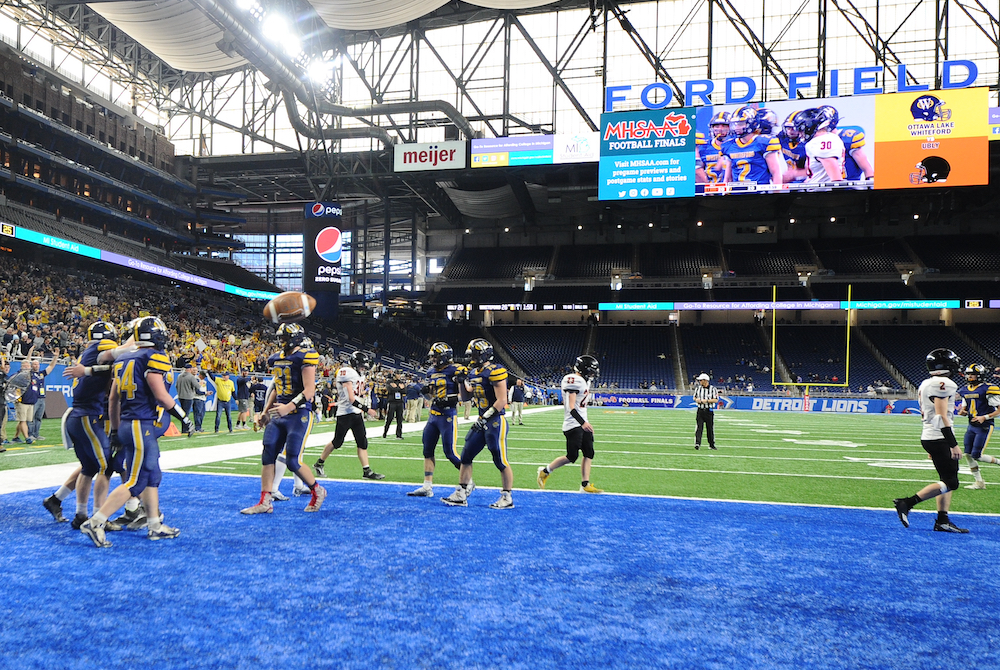
Be the Referee: Automatic 1st Downs
October 24, 2019
This week, MHSAA officials coordinator Sam Davis explains differences in high school football rules regarding automatic first downs from similar rules at the college and pro levels.
Be The Referee is a series of short messages designed to help educate people on the rules of different sports, to help them better understand the art of officiating, and to recruit officials.
Below is this week's segment - Automatic 1st Downs - Listen
Today we are going to talk about one of the biggest rule difference areas in high school football from those rules used in college and pro games – automatic first downs.
When watching that college game on Saturday or the pro game on Sunday, all of us know there are several defensive fouls that give the offense an automatic first down. However, under high school rules, the opposite is true most of the time.
The only high school fouls that result in an automatic first down for the offense are the roughing fouls – roughing the passer, the kicker, the holder and the long snapper. Fouls such as defensive pass interference or any other personal foul do not bring an automatic first down under high school rules.
Past editions
Oct. 17: Catch Momentum - Listen
Oct. 10: Golf Rules Changes - Listen
Oct. 3: No Tackle Box - Listen
Sept. 26: You Make the Overtime Call - Listen
Sept. 19: Swimming Finishing Touch - Listen
Sept. 12: Curbing Gamesmanship By Substitution - Listen
Sept. 5: Football Safety Rules Changes - Listen
Aug. 29: 40-Second Play Clock - Listen

Set, Ready, Challenge: 11-Player Football Finals Challenges New in 2022
By
Jon Ross
MHSAA Director of Broadcast Properties
November 25, 2022
New this year at the MHSAA 11-Player Football Finals is the opportunity for head coaches to challenge a call.
In previous years, all potential scoring plays and potential turnovers were automatically reviewed. That process will continue and now, under a limited set of circumstances, the head coach can challenge calls.
To do so, the head coach must first call a timeout. If a team has no timeouts remaining, they are not able to challenge a call. Challenges must be presented to the officials immediately after the timeout is granted. If the challenge is successful, the team will get its timeout back and have the ability to challenge one more call during regulation. A second successful challenge will not result in the ability to challenge a third call.
The following plays are reviewable by challenge:
- Complete/incomplete passes
- Runner/receiver in/out of bounds
- Runner ruled not down
- Forward progress spot as it relates to the yard to gain
- First touching of a kick
- Recovery of a ball in/out of bounds
- Forward/backward pass
- Penalties called on the field only for:
- Illegal forward pass
- Targeting or illegal helmet contact
- Pass interference only as it relates to the pass being previously tipped
NOTE: All other penalties called on the field are not reviewable. These include, but are not limited to: illegal formation, ineligible receivers downfield, illegal participation, illegal substitution or delay of game. If a penalty is not called by the officials on the field, the play can never be reviewed to retroactively call a penalty.
In overtime, challenges – like timeouts – reset. Each team has the ability to challenge one call for the entirety of overtime, but must have a timeout to use to do so. A successful challenge in overtime will not result in the ability to challenge a second call.
If a play is overturned in regulation or overtime, the replay officials will correct all aspects of the play including time, position of the ball and whether the clock will be started on the RFP or snap. The game clock or play clock may be reviewed only as it directly relates to the overturning of a call on the field.
There is no change to the review of potential scoring and potential turnover plays. Those plays are automatically looked at by the replay official and replay assistant. If the replay official can confirm the ruling on the field without stopping play, the official will do so. If more time is needed to review the play, the on-field referee will announce that and then will announce the replay official’s decision. For a play to be reversed, there must be indisputable video evidence that shows the original call was incorrect. Every attempt will be made to complete the review process in 90 seconds or less.
The addition of the coach’s challenge was approved by the MHSAA’s Representative Council at its May 2022 meeting.

